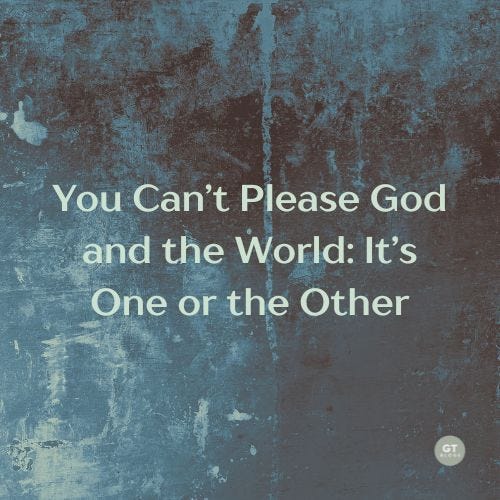I realize I'm jerking the paid subscribers around a bit, posting bits and pieces of several works in progress, but that's part of the fun of what Substack offers: the chance to share works in progress, hopefully garnering feedback while I refine my thoughts. And I hope these words can be an encouragement to you, as it'll be years before they are published in formal print. (This is likely going to be the book I'll seek to publish after I publish the book on hurting Christian parents.)
Where this chapter fits into the book on divine affirmation: we won't revel in divine affirmation if we don't value divine affirmation. If we continue to seek our joy from the world's approval and acclaim, we'll stop seeking God's approval and acclaim, as the two are at odds with each other. This is chapter three: after presenting the joys of being "good enough for God" (through Christ), it asks the reader, "Will this become more valuable to you than being good enough for the world?" In the end, we have to choose which "city" we want to dwell in — Babylon or Jerusalem.
A Tale of Two Cities:
Great in the Sight of the Lord
“Woe to the man that hath his portion in this life! O miserable health, and wealth, and honor, which procureth the death, and shame, and utter destruction of the soul!”
Richard Baxter[i]
God must have known that John the Baptist’s spiritual call would make him seem weird, abrasive, and an outcast. How could he get such a servant ready? What vision could he give him to replace what he knew John wouldn’t get from the world? John would have to derive courage from an entirely different realm because there would be no encouragement, no praise, no succor from this world to keep him going.
God prepared John the Baptist for a life of human alienation and suspicion by pouring out abundant divine affirmation. Before John was even born, an angel said, “he will be great in the sight of the Lord.”[1]
That sentence, “great in the sight of the Lord” is where divine affirmation is born. It is contrasted in the Bible with “great in the sight of the world.”
You could spend an entire afternoon trying to count how many times “Babylon” appears in the Bible.[2] She is the very picture of human greatness. She is called the “glory of kingdoms” (Isaiah 13:19) and often referred to as “Babylon the Great” (Revelation 17:5, 18:2). But these monikers are meant to be read as worldly evaluations, almost with sarcasm. “She seems so great and mighty, but watch her fall…”
In contrast to Babylon the Great, Jerusalem is “the Holy City” (Revelation 21:2). Notice the intentional difference in language. One city is “great” in the eyes of the world; another city is “holy,” i.e., set apart for God, great in the sight of God.
Do you want to be “great” in the sight of the world or “holy” and great in the sight of God?
Do you want to be defined by how the world views you or by how God views you?
At times (in fact, most of the time), these opinions will go to war against each other; if we don’t place all our hope, joy, focus, and energy on our allegiance to God, we’ll be torn apart in the inevitable struggle between allegiance to one or the other. If I’m a wide receiver playing in the NFL and the quarterback throws me a pass, I don’t have time to decide which end zone to run toward. If you’re playing soccer but have placed a bet on the other team winning, you’ll run circles in the middle of the field—do I kick this way, or that way? You’ll look like a fool.
Decisiveness is everything when it comes to living out of the affirmation of God and living for the glory of God.
God may not ask us to be as “weird” as John the Baptist was. We may not have to dress so unfashionably or eat locusts while we stomp around the desert and rail against the political authorities. But our motivation should be the same: to become “great in the sight of the Lord.” Who cares what anyone else thinks? Seek greatness in God’s eyes, and God’s eyes alone.
Keep reading with a 7-day free trial
Subscribe to Simply Sacred with Gary Thomas to keep reading this post and get 7 days of free access to the full post archives.




